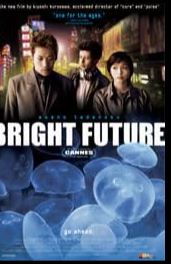
When one of the central characters in a film is a man with fetishistic fixation on his pet jellyfish and he inexplicably bludgeons two people to death before wrapping himself in wire and committing suicide, you can be fairly certain that the film comes from Japan. I’m being a bit unfair in making this sound like one of Miike’s festivals of shock and weirdness; it isn’t. Bright Future is a deliberate, thoughtful film.
I’m impressed by this director. I’ve seen a couple of films now by Japan’s Kiyoshi Kurosawa and every other available title of his is in my rental queue at GreenCine. Two films are enough to know that this is a very talented filmmaker. Yet, inexplicably, Kurosawa gets almost no recognition in the English-speaking world. No major publication reviewed this, his most recent film. IMDB.com doesn’t even have an image for it. So far, the man has attracted attention primarily from eggs (white on the outside, yellow on the inside) like our own Mr. B and Schultz. Based on Bright Future and the other Kurosawa film I’ve seen, Serpent’s Path, most of you are missing out on one of the better directors working today.
The character descried above is one half of a pair of best friends. Both set out to murder their boss and his wife, but the non-jellyfish dude gets there first and gets the culpability for the action the both intended. He hangs himself in prison, leaving the other to attempt to adapt his jellyfish to fresh water. But the weirdness of this story has more of a surreal quality than a shocking or novel one. The strangeness of the events is incidental to a beautifully made film about characters and themes of apathy, anomie and isolation.
After the suicide, the surviving boy develops a relationship with the estranged father of his friend, but the relationship never really takes off. There are moments of connection, but a deeper alienation runs between the two. They are able to adapt the jellyfish to freshwater, but this a predictable disaster because the jellyfish, while beautiful, is poisonous.
Bright Future is full of metaphors like the jellyfish. The father works restoring old appliances, but when a client speaks of the character of the items, the father admits that he considers them junk. I like these metaphors because I couldn’t really pin them down. True, the jellyfish bears some similarities to the two boys. Both seemed able to function on their own, but became dangerous when mixed into society, but the connection isn’t that simple or plain. The jellyfish, the appliances and other aspects of the film seemed to a have an open meaning. You could read into them, but they aren’t direct analogies. This helps to give the film a dream-like quality and style.
Bright Future has a similar quality thematically. It continually produces a sense of disconnectedness and also meaninglessness; things not working, but never any concrete lessons. I strongly prefer art that evokes thought rather than dictating thoughts. Bright Future, with its open metaphors and powerful imagery stirs the imagination rather than capturing it. I can’t wait to see more from Kurosawa.